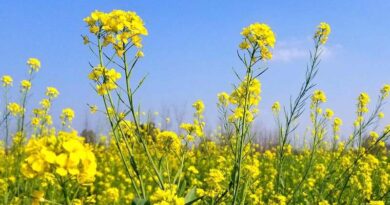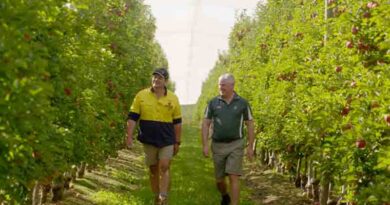Australia: $8.2M national project to boost canola establishment
02 March 2023, Australia: A new $8.2 million research project announced today (March 2) will deliver new management packages to Australian grain growers to increase the reliability of canola establishment.
The four-year project, a co-investment between GRDC and Australia’s national science agency CSIRO, was announced at the GRDC Grains Research Update in Bencubbin, Western Australia.
Canola is Australia’s third largest crop, with production forecast to reach a new record of 7.3 million tonnes in 2022/23.
But while canola has come a long way since its beginnings in Australia in the 1970s, there is still room for improvement, particularly regarding aspects of crop establishment.
GRDC Western Panel chair Darrin Lee says poor establishment of canola was a widespread problem with, on average, only 50-60 per cent of seeds capable of germination successfully establishing.
“Successful canola establishment is foundational to delivering a profitable crop,” Mr Lee says.
“Unreliable canola establishment can lead to difficulties with weed management, reduced yield potential and, with canola, sometimes resowing is required. These establishment risks have only increased with the trend to earlier sowing.
“This new project is a national approach that builds on a 2019 GRDC investment of $13.2 million with CSIRO, which focused on genetic solutions to help canola breeders develop varieties that better establish in growers’ paddocks.
“These genetic solutions will now be paired with a comprehensive agronomic package, combining genetic, environmental and management factors, that growers can use to improve their canola establishment and ultimately, improve the profitability of this crop.”
A survey of canola growers and agronomists across Australia in February 2020 found the most common causes of poor establishment were marginal soil moisture (76 per cent), incorrect sowing depth (65 per cent) and soil crusting (29 per cent).
Subsequent genetics work has been addressing these challenges, and the new project incorporates canola varieties with enhanced early vigour and longer, stronger hypocotyls – the stem of the germinating seedling – to improve the emergence from deeper sowing to access more moisture.
Lead researcher and CSIRO farming systems scientist Dr Andrew Fletcher says that work would focus on the underlying processes affecting canola establishment and provide management strategies to mitigate establishment risks.
“The project will develop a decision framework growers can use to assess the conditions for sowing canola, and identify risks for poor establishment,” Dr Fletcher says.
“This means they can go into the paddock at seeding time and look at their moisture content, soil type and the time of year and understand the risks, as well as the further management options they might have to improve establishment under those specific conditions.”
Dr Fletcher says that in recent years, growers were sowing canola earlier to take advantage of rainfall events rather than waiting for traditional sowing times.
“Ten years ago, I don’t think anyone would have thought about sowing canola in March. Now, when there’s a rainfall event, growers start looking at late March or early April to sow their programs.
“Previous GRDC investment into early sown canola and its profitability demonstrated that there is extra yield potential when sowing early. This project will help take the establishment risk out of early sowing.”
The project will be informed by significant consultation with growers, agronomists and industry, with a national grower survey currently underway to help identify key management factors that might affect establishment.
GRDC sustainability cropping solutions manager – west, Dr Rowan Maddern, says the project would bring together outcomes from recent GRDC research, development and extension projects in canola to directly address an issue growers had at the top of their agendas.
“Feedback from GRDC National Grower Network (NGN) meetings in all GRDC regions confirms canola establishment is of ongoing concern to growers, with different soil types also providing distinct challenges,” Dr Maddern says.
“In addition to the previous canola genetics project with CSIRO, since 2021 GRDC has also invested in field experiments in WA and NSW to further ground-truth these new gene discoveries.
“Now, this national project will deliver on-farm outcomes to equip growers with the confidence to respond to both changing climates and changing farming systems through their canola programs, and ultimately, maximise their profitability.”
Project partners include the WA Department of Primary Industries and Regional Development, EPAG Research Trust and the NSW Department of Primary Industries. The project Reducing risks to canola establishment through an integrated understanding of genetics, management, and environment is set to be completed by mid-2026.
Also Read: Concern over Wheat production due to the ongoing heatwave
(For Latest Agriculture News & Updates, follow Krishak Jagat on Google News)















